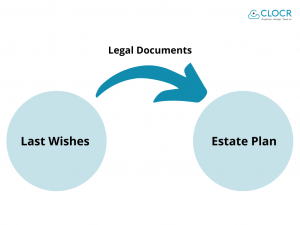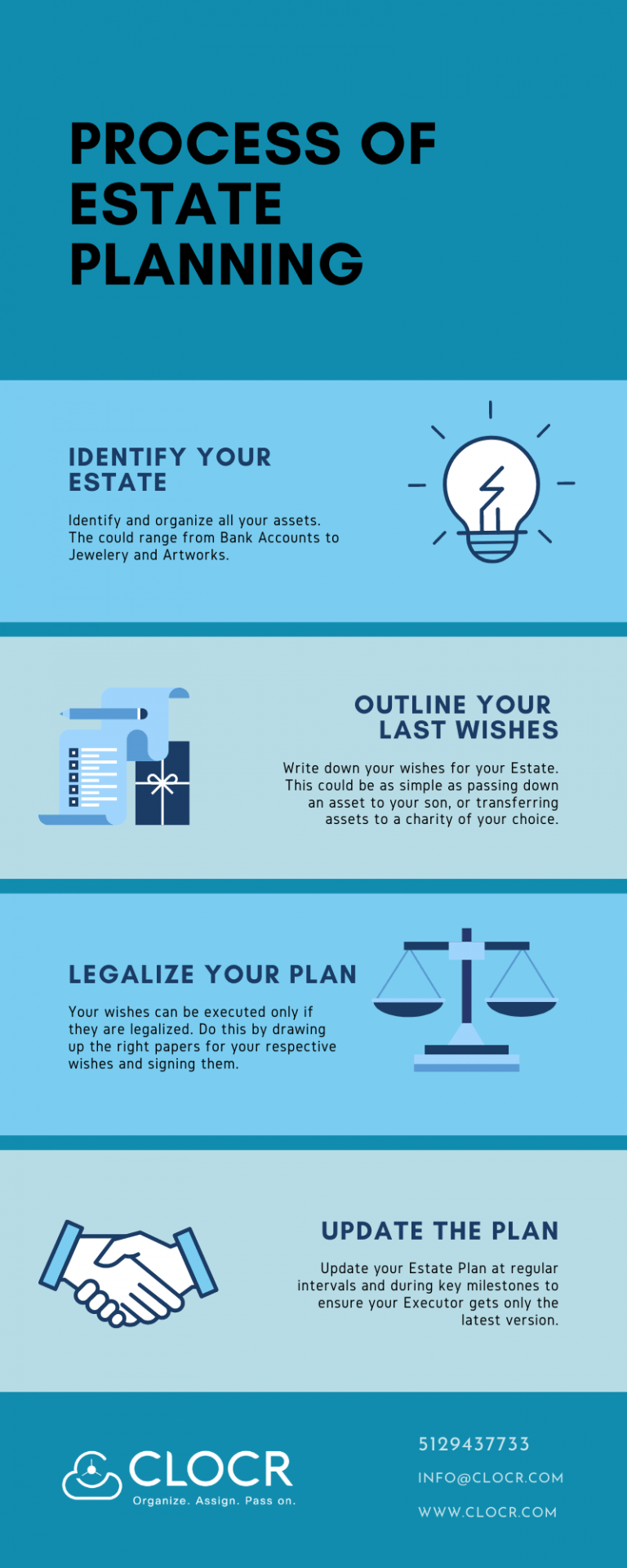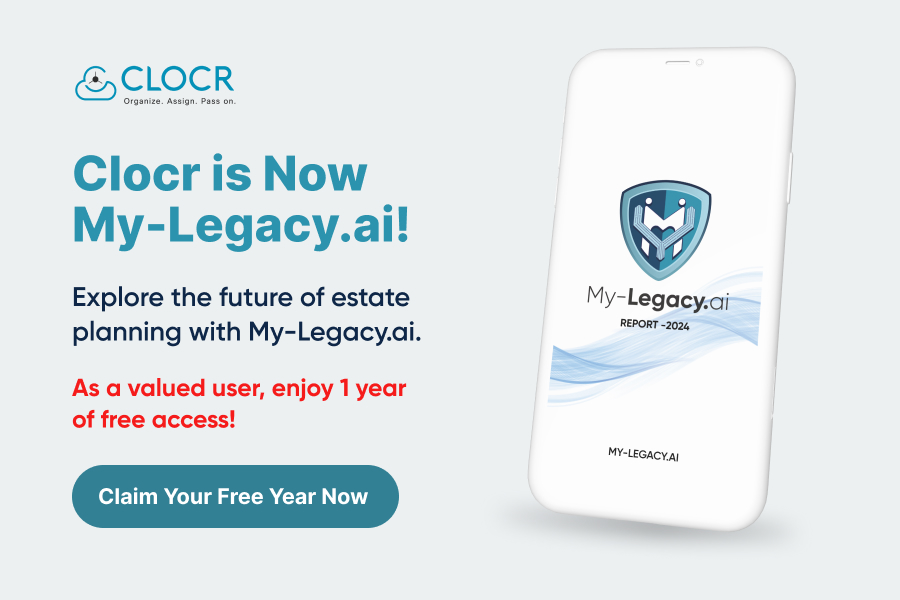If you’re like most people, you probably plan to or have spent most of your life accumulating wealth and assets to keep your loved ones beyond comfortable and content.
But what would happen to this plan if you were to meet with a medical emergency or pass away?
Do you know what would happen to your Estate when you’re not around anymore? Have you made plans to take care of your loved ones if there was an emergency?
Whether you have or have not, careful Estate Planning is your solution.
What you’ll learn in this article:
- What is an Estate?
- What is Estate Planning?
- Impact of COVID-19 on Estate Planning
- What is a Beneficiary?
- What is an Executor of an Estate?
- Why is Estate Planning Important?
- Do You Need Estate Planning?
- How to Start Estate Planning?
- I have created an Estate Plan, now what?
- When to Begin Estate Planning?
- Common Estate Planning Challenges
- Estate Planning Best Strategies
- Common Estate Planning Questions
What is an Estate?
An Estate is your financial valuation. This includes everything you own that holds monetary value. Typically, an Estate includes:
- Cash
- Bank Accounts
- Retirement Accounts
- Artwork
- Jewelry
- Vehicles
- Property
- Digital Assets
What is Estate Planning?
Estate Planning is the process of creating a plan for your Estate after your death. This process involves filling out documents like Wills and Powers-of-Attorney to legally authorize your last wishes for your assets.

Thinking about Estate Planning is difficult and a seemingly morbid thought to plan for. However, Estate Planning can be understood in a positive context when looked from a different perspective: it is the process of keeping your beneficiaries financially secure for a long time even after you’re gone with the help of legal documents and an executor.
Impact of COVID-19 on Estate Planning
COVID-19 has changed Estate Planning discussions. Before 2020, family conflict was a leading factor that led people to not plan for their Estates, according to a TD survey. After the pandemic hit, however, family conflicts became a reason for Estate Planning because:
- Divorce rates increased
- Tough family choices had to be made
- Needed something sure in the face of uncertainty
Increasing healthcare costs and prolonged life expectancy, however, are primary threats to the process of Estate Planning, along with political conflicts and tax reforms. (back to top)
What is a Beneficiary?
A Beneficiary is a person or an entity that would receive your Estate, or parts of your Estate, based on the wishes you express in your Estate Planning Documents. Usually, beneficiaries are your next-of-kin, like your spouse or children or parents or grandchildren, who have a set of their own rights.
Rights of a Beneficiary
- Be provided with information about your role
- Request for a copy of the Will
- Request for removal of executor
- Receive entitlement regularly
- Be treated fairly
- Receive detailed financial reports
Remember, there are different types of beneficiaries that you will have to pay attention to while deciding who should get what in your Estate. (back to top)
What is an Executor of an Estate?
An Executor is someone you appoint in your Will to execute your Estate Plan. This could be a close friend, a family member, or even your lawyer. A common concern regarding appointing executors is not knowing where their duties start and where they end.
Rights and Duties of your Executor
- Interpreting the Will
- Carrying out Funeral wishes
- Obtaining death certificate
- Settling Estate matters based on testator’s plan
- Managing expenses of the property
- Paying debts or collecting dues owed
- Maintaining records of transactions
- Representing testator in legal action
What an Executor Cannot Do
- Execute anything before the passing of the testator
- Signing on behalf of the testator
- Taking action before being appointed by the court
- Sell assets below market value without approval from beneficiaries>
- Change Will provisions
- Stop beneficiaries from contesting

Why is Estate Planning Important?
The primary need for Estate Planning is to be able to pass on or manage your assets the way you wish to after your death. Estate Planning gives you the legal power and authority to transfer and manage your assets the way you want to after your death. The benefits of Estate Planning extend beyond transferring and managing assets after your death.
Estate Planning allows you to not just provide financial security to your loved ones and beneficiaries, but also help them deal with your passing a little better—minimizing tax liabilities, preventing family feuds, reducing probate complications, etc.
Consider this Estate Planning example: Susan is 30 and a single mother of two. She works full-time and has invested in cryptocurrency. She wants to provide the best of education and comfort to her children. Say, in a few years, Susan is diagnosed with a fatal disease and passes away. In that situation, Susan’s early Estate Planning will let her support her children even after passing away. The legal documents she put together, like a Will, Will for Digital Assets, Guardianship Designation, etc. can help secure her children’s financial and guardianship situation with reduced complications.
Reasons for Estate Planning
- Increase scope beyond Wills or Trust
- Protect your beneficiaries
- Be with family even after passing away
Advantages of Estate Planning
- Helps loved ones deal with financial and legal hurdles
- Helps avoid internal family conflicts
- Helps transfer your assets to someone you want
- Minimize tax liabilities on your Estate
- Ensures trusted people execute your plan
- Reducing Probate complications
What Happens if You Don’t Have an Estate Plan?
In the absence of an Estate Plan, the court decides what happens to your Estate. It also decides who gets what percentage of your assets based on state-specific regulations . These are commonly referred to as intestacy laws.
Now that you know why Estate Planning is important, ponder upon this: do you know what will happen to your loved ones and assets if you were to pass away?
Do You Need Estate Planning?
Here’s a method to identify if you need to start planning for your Estate. Ask yourself:
- Do I have loved ones who depend on me financially and/or emotionally?
- Do I wish a special someone to have something I own after my demise?
If you answered yes to either of the two questions, Estate Planning is the guaranteed legal solution to your concerns.
Who Needs Estate Planning?
If you believe that Estate Planning is for the rich or for those with complicated assets and family situations, you might be surprised!
Estate Planning is for everyone with an Estate. An Estate comprises all and any financial possessions ranging from cash and property to furniture and artwork.
Estate Planning for Millennials
Millennials today are embracing conversations about death. Media refers to them as the death positive generation. Millennials are also conscious about their independence, their ideologies and politics. Consequently, Estate Planning is a financially and politically right step in the direction of being socially responsible and more aware about their finances today and after they’re gone.
Estate Planning for Retirees
Estate Planning constitutes a large portion of your Retirement Planning. For those planning to retire soon, Estate Planning is a vitally important factor that you need to consider. An Estate Plan that is in coordination with your Retirement Plan allows you to direct your Retirement Plan assets into your Estate and protect your beneficiaries better.
Estate Planning for Pet Owners
There is a large lifestyle and ideology shift concerning pets. This is reflective in Estate Planning too. What would happen if you were to pass away before your pets? Who would take care of them?
Estate Planning for Pets allows you to arrange for a way to take care of your pets and ensure their safety after you’re gone. You can do this by appointing a pet guardian and/or by setting up a Trust to fund for anything that might be needed to take care of your pets, like food, medical emergencies, etc.
Estate Planning for people with children
What would happen to your children if you were to pass away? Especially if they are minors? An Estate Plan can help you make it easier for your kids. Using an Estate Plan, you can set up a Trust for your minor children and appoint guardians for them. If you have children older than 18, you can open a Trust to fund for their education and pass on your assets.

Estate Planning for Married Couples
A married couple may own multiple assets or accounts together. While most people create Joint Wills, it is better to create individual Estate Plans to make sure that your spouse can change the plans depending on the situations after you pass away.
Estate Planning for Unmarried Couples
While courts can protect the rights of family members in the absence of an Estate Plan through intestacy laws, unmarried couples do not have this advantage. Courts do not recognize non-blood related and unmarried relations as legal relations.
Creating an Estate Plan by mentioning the legal name of your partner will help you protect your partner if you were to pass away.
Estate Planning for Dependents with Special Needs
Experts suggest that the best way to financially and medically support your dependents with special needs is by setting up a Trust for them.
How to Start Estate Planning?
There is no sugar-coating it, the process of Estate Planning is complicated. However, when you start early and keep your process organized, you make it so much easier for yourself and your loved ones.
Typically, the process of creating an Estate Plan is four-fold.
First, you need to identify and organize your Estate. You can do this by opening a Digital Vault like Clocr that allows you to easily and securely store, share and update important documents.
Second, you need to outline your wishes for your estate. This includes asking yourself questions like:
- Who should be my beneficiaries?
- What do I want to leave for each beneficiary?
- Who should execute my Estate Plan?
Third, you need to legalize your plan. This requires you to consult with professional experts like estate lawyers and financial advisors. Next, you need to fill out Estate Planning documents specific to your Estate and your Estate Plan.
Fourth, you need to update it regularly.

How to pass on values while Estate Planning?
Popularly, Estate Planning is used for transferring financial assets upon death. However, most people seem to overlook passing on values and memories too. This can be done by keeping the values you want to pass at the forefront of your mind while drawing up papers and plans. For example, not adding your vacation home to a Trust or by transferring specific assets to charities, etc.
How to choose a Beneficiary?
The primary purpose of adding beneficiaries to your Estate Plan is to protect them. So, ensure that you are choosing people who depend on you, and you would want to financially support after your death
An Estate Plan helps you pass on more than money. If you have a family heirloom that should go to a special someone, name them as a beneficiary for that asset too.
How to choose an Executor?
An Executor manages and executes your wishes after your death. They would also be in constant contact with your beneficiaries. While choosing your executor, therefore, you want to make sure that they understand your Estate, have at least some technical knowledge about Estate Planning and their role in yours. Most importantly, your beneficiaries need to be comfortable with the Executor you choose.
What Estate Planning Documents do you need?
- Will
- Trust
- Powers-of-Attorney
- Guardianship Designations
- Letter of Intent
- Beneficiary Designation
How and why you need to organize Estate Planning Documents?
Categorize your Estate Documents based on their purpose, and further refine the categories based on priority. This would help you not lose them, update them easily and access them conveniently when required.
While the process may seem complicated, digital tools make this easier and safe. Consider Clocr’s Vault.
Before getting started with any of these steps, however, take some time to get some clarity on why you want to create an Estate Plan. Asking yourself some questions is usually the simplest way of going about it.
Things to consider while creating an Estate Plan
- How much do you and your family need to live your lifestyle while you’re here and after your death?
- Does your business have an exit or succession plan?
- Who do you want to primarily provide for? Your spouse and kids, or parents and grandparents, or all?
- Would you be willing to reduce tax liabilities on your Estate by giving asset(s) away?
- Have you appointed executors, beneficiaries and guardians with complete confidence?
How to talk to family about Estate Planning?
- Don’t put it off
- Be Transparent about all participants and documents
- Educate them with notes and instructions
- Remember to be empathetic
- Pick the right timing and environment.
- Remember, it is never to early but can be too late
How to Motivate Yourself to Start Estate Planning?
There are two primary reasons why most people find it hard to start Estate Planning:
- It’s too difficult to think about your own death
- The process is too complicated
Don’t worry, there are ways to get past these problems and start planning for your Estate:
- Think about Estate Planning in positive words: Remember, it is about keeping your loved ones safe, not about you dying. It is about preserving your legacy, not about you dying.
- Uncomplicate the process: Use a simple checklist or step-by-step guide to give yourself short goals.
- Celebrate small achievements: This can help reduce the anxiety around creating the perfect Estate Plan immediately and make way for the final draft of your Estate Plan!
- Ask for Help: There’s no denying Estate Planning is complicated. Getting help from professionals like Estate Lawyers and Financial Advisors can help make the process less complex and reduce any hindrances that might demotivate you.
I have created an Estate Plan, now what?
- Store documents at a safe and accessible location.
- Make multiple copies of all documents and share it with your beneficiaries, executor and professional advisors
- Start listing your Digital Assets
- Update it regularly
- Discuss with your family

When to Begin Estate Planning?
Commonly, people start their Estate Planning process after a major life event—an accident, a marriage, etc. However, the ideal time to start the process is as early as possible. Early Estate Planning would give you plenty of time to identify your assets, make an efficient plan to help your loved ones, your assets and yourself.
Emergencies come unannounced, regardless of age, income and family situations. Being prepared for them would give you the headstart you need to protect your life’s worth and all your friends and family from easily avoidable heartache and complications.
Why is Early Estate Planning important?
The earlier you start, the better chances you have at understanding the Estate Planning process better. This helps you understand the true value of all assets, some which might not seem like an asset at the first instance. For example, a piece of painting.
More importantly, it helps you stay ahead and plan for emergencies that occur irrespective of age. The best time to start Estate Planning is as early as possible, ideally today.
How often should you update your Estate Plan?
A crucial step to Estate Planning is updating it. There is no value in an Estate Plan if it is twenty years old when it’s being used. Most information about the assets and the wishes might be outdated. Perhaps, the value of the assets is different or they have become more complex in nature. Maybe the beneficiaries that were assigned are no longer ideal candidates or they have passed away too.
Updating your Estate Plan in regular intervals—every 4 to 5 years—can help you avoid such problems.
When Should You Update Your Estate Plan?
Ideally, you want to revisit your Estate Plan regularly and look for data or wishes that you’d want to change. However, there are other times when you need to update your Estate Plan:- Marriage
- Birth of children/grandchildren
- After heavy investments
- After moving houses
- Business partnerships
- Starting a business
- After a death in the family
(back to top)
Common Estate Planning Challenges
- Coordinating Estate Plan with Retirement Plan
- Incorporating flexibility in plan
How to overcome Estate Planning challenges
- Consider Retirement Plan Trust
- Consider all situations while creating a plan, like untimely mental incapacity, changing laws, beneficiary bad habits, etc.
Estate Planning Best Strategies
- Educate yourself about federal and state death taxes
- Consider Annual Gift Tax Exemption
- Take advantage of Generation-skipping Trust
- Convert Retirement Accounts to Roth Accounts
Common Estate Planning Mistakes
- Not updating your plan or documents
- Not thinking about your Estate Plan and Retirement Plan together
- Doing it all by yourself
Do's and Don'ts of Estate Planning
DOs
- Seeking Expert Advice
- Thinking about who should be your executor
- Starting Early
- Creating an Emergency Plan
- Discussing with your loved ones
- Adding Digital Assets
DONT’s
- Do too many things at once
- Postpone starting an Estate Plan
- Assume you’re done
- Think someone can figure it out
Estate Planning Tips
- Keep researching and stay up-to-date with the industry
- Look for online tools like Digital Vaults and Legacies that reduce complexity
- Review your basics
- Consult with a professional
- Organize your documents
- Update documents every year, if possible
- Look at samples and templates
Common Estate Planning Questions
Estate Planning vs Will
Estate Plan
- Is a process
- Involves filling multiple documents, including Will
- Helps do everything a Will can, along with appointing agents to handle emergencies, etc.
- Can be active during lifetime and after death (depending on documents)
Will (Last Will and Testament)
- Is a single document
- Is part of Estate Plan
- Helps pass on assets
- Helps choose beneficiaries and executors of Will
- Affective upon death of testator
Estate Planning vs Legacy Planning
Estate Planning
- Helps manage Assets after death
- Includes legal documents
Legacy Planning
- Helps leave a legacy and manage Assets after death
- Includes legal documents and personal items like letters, videos, etc.
Estate Planning vs Retirement Planning
Estate Planning
- Plan for assets and beneficiaries after death
- Includes Documents like Wills and Trusts
Retirement Planning
- Plan for after retirement
- Includes Estate Planning
Do I Need a Will or a Trust?
While some suggest that it is ideal to have both, it truly depends on your personal choices and situations. You can arrive at this decision by understanding the difference between Wills and Trusts and correlating them with your Estate Planning needs.
What is a Power-of-Attorney?
Power-of-Attorney is a legal document that lets you give legal authority for someone else to make decisions on your behalf. Based on the kind of decisions you let them take, they are categorized into different types of powers-of-attorney.
What is Probate?
Probate is the process of dealing with the Estate of someone who has died. This is where an Estate Plan is executed.
What is a Pre-death Probate?
Pre-death Probate is the process of probating an Estate Plan before the death of the testator. This helps you file the Estate in a court beforehand so that your loved ones do not lose time, money and energy in probate. The plan goes into effect only after the death of the testator.
How to Choose an Estate Lawyer?
The best way to know if an Estate Planning lawyer is for you, is by knowing how they have helped other clients. Word-of-mouth via friends and family are the ideal ways in which you know if you should consider meeting with the Estate Lawyer. However, if this is not possible for you, reading reviews online is the next safest option.
Once you have shortlisted some Estate Lawyers, you need to know whom to choose. For this, meet the lawyers and talk to them. Ask them some important questions that you prepare for beforehand, since each minute you spend with them is billable. Estate Planning is about your entire life and beyond, you want to make sure that you’re on the same page with them.
Do I Need a Financial Advisor?
Yes.
Having a Financial Advisor can get you more than financial advice, while that may be a major part of what you get. A Financial advisor can help you keep your documents and other Estate Planning components up-to-date, help you reduce the tax liabilities on your Estate, secure your loved ones’ financial stability long after you’re gone, etc.

